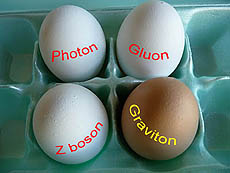“
Gravitons
 |
| Sesame Street has a learning game that goes with the jingle "One of these things is not like the other. One of these things just doesn't belong." Can you find which one is different? |
If you've read anything about the kinds of physics we do at Fermilab, you've heard lots of words ending with "on" – words like proton, neutron, gluon, photon, boson, fermion and on and on and on. One of the words you might have encountered is the graviton. Let's get one thing out of the way: At the moment, gravitons are entirely theoretical constructs that delicately walk the knife-edge precipice between the domains of scientific respectability and the shady world of hand waving.
The fantastic success of quantum theory to describe three forces – electromagnetism and the strong and weak nuclear forces – provides a considerable impetus to try to marry it to the fourth force of gravity. In the same way that the photon is known to be the quantum particle of the electromagnetic force and the gluon is the quantum particle of the strong force, the "graviton" is the name given to a hypothetical quantum particle of the gravitational force.
However, a quantum theory of gravity has so far been elusive. Einstein's theory of general relativity has been the most successful description of gravity, but when it encounters the quantum realm, it predicts nonsense, with impossible infinities popping up throughout the calculations. Infinities like that are nature's way of saying "back to the drawing board." And though theoretical physicists have quite a way to go in coming up with such a model, it is still possible to work out some of the properties of gravitons. (Continue to read on Fermilab Today)
|
No comments:
Post a Comment